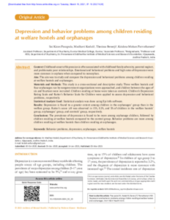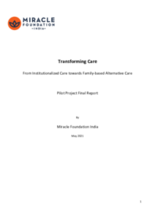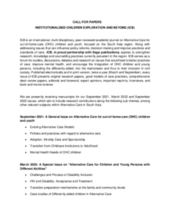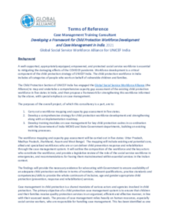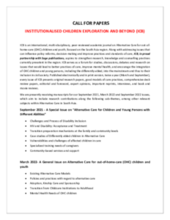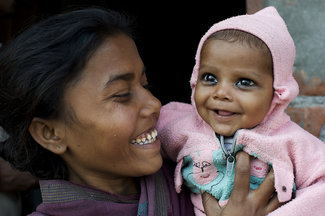

Displaying 181 - 190 of 753
The aim of this article was to study and compare the depression and behavioral problems among children residing at welfare hostels and orphanages.
This grounded theory study aimed to theorize pathways through which orphaned adolescents within institutional care navigate to achieve positive adaptation.
This is the summary report for a pilot project spearheaded by Miracle Foundation India with its two partner organizations which were two Children's Care Institutions (CCIs) in the Indore District in central India. The goal of the pilot was to ‘create a replicable modal for other CCIs to effectively implement family based and alternative care through systemic change by engaging multiple stakeholders’.
ICB is presently receiving manuscripts for their September 2021, March 2022 and September 2022 issues, which aim to include research contributions along relevant subjects within Alternative Care in South Asia.
The Global Social Service Workforce Alliance is seeking a consultant to support the mapping and undertaking of a comprehensive capacity gap assessment of the existing child protection workforce in five states in India, and then propose a framework for strengthening this workforce informed by the above, with special emphasis on case management.
"The outbreak of the pandemic in March had brought the adoption process to a standstill for several reasons – lack of information, closure of courts and fear of contracting the infection," says this article from the Hindustan Times.
ICEB invites research studies, legal and human rights-based perspectives, mental health frameworks, and innovative practices in support, training and development for caregivers in alternative care settings, as well as good practices/models in the South Asian region.
This research explored the experiences of the postmarital life of women with a history of residence in foster care centers. It was conducted using a qualitative content analysis.
The Department of Social Defense has placed 27 children in foster care in the state of Tamil Nadu after a gap of nearly six years, according to this article from the Times of India.
The present research study is an exploratory study to examine factors like lack of communication and attachment to parents, abuse, poverty and peer influence with a sample size of 100 runaway children (50 girls, 50 boys) residing in a non-governmental organisation in NCR, Delhi.

